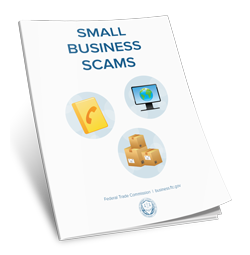You’ve got lots of needs as a business owner – among them, supplies you rely on from square-dealing vendors. But what if the vendor misleads your staff about the price or quantity of those supplies, hits you with a huge invoice you didn’t authorize, and then tries to pressure you into paying it? Those are just some of the sales tactics the FTC is challenging in recent law enforcement actions.
In three unrelated cases, the FTC has sued California-based Kleritec, Maryland-based Lighting X-Change, and Texas-based Omni Services for allegedly duping small businesses, schools, churches and nonprofits out of millions. How? By charging them for merchandise they didn’t order or at a price much higher than they initially promised.
According to the FTC, Kleritec and Lighting X-Change followed a similar modus operandi. Telemarketers called small businesses or nonprofits with offers of free samples or inexpensive supplies, but then followed up with inflated invoices, more shipments of unordered supplies, and more unauthorized invoices. When companies stood their ground and contested the bills, the FTC says the defendants used bullying tactics to try to get them to pay up.
The FTC’s action against Omni Services alleges that telemarketers called churches, schools and businesses and deceptively claimed to be offering sale or clearance prices, but used vague language about cost and quantity. Then, the complaint alleges, Omni sent large shipments at higher prices, used pressure tactics to collect, and sometimes followed up with more unordered shipments.
The complaints charge Kleritec, Lighting X-Change, and Omni Services with violations of the FTC Act, Telemarketing Sales Rule and Unordered Merchandise Statute. The lawsuits are all pending in federal court.
Small businesses and nonprofits can be particularly vulnerable to questionable B2B sales tactics. Keep these points in mind to help prevent a supplies surprise:
- If your business received merchandise no one on your staff ordered, the law says the vendor cannot legally collect on it. You don’t have to pay for it, even if someone in your business used the supplies before you realized they were unordered, and you don’t have to return it.
- If a vendor tries to make you pay, make them give you proof of the sale – for example, a purchase order. Scrutinize anything you receive and pay only if what they send you checks out. Type the company name and words like “scam” or “complaint” into a search engine to see if others have complained about similar tactics from the same outfit.
- Be sure your staff – including anyone who answers the phone – is trained in your company’s accounts payable and procurement procedures. Deceptive telemarketers may target less experienced employees or occasional volunteers to get them to “confirm” orders by falsely claiming an ongoing business relationship with your company. Designating one staffer as the go-to person for all periodic purchases reduces the risk of a supplies surprise.
 Keep a central file with the names of the vendors you use for supplies you buy periodically. If you get an invoice from an unfamiliar vendor, ask your staff if anyone recognizes it. Even if someone does recognize it, check to make sure that the goods, quantity, and price match what your staff expected to see.
Keep a central file with the names of the vendors you use for supplies you buy periodically. If you get an invoice from an unfamiliar vendor, ask your staff if anyone recognizes it. Even if someone does recognize it, check to make sure that the goods, quantity, and price match what your staff expected to see.- Active in your local school, church, or community organization? What about your kid's daycare provider? They can be targets for questionable supply promotions, so encourage them to put the same safeguards in place – and leave a free copy of the FTC’s brochure Small Business Scams with the person in charge. They’ll appreciate advice from someone with your business know-how.
If your business received merchandise you didn’t order and you’re being pressured to pay, file a complaint with the FTC.
